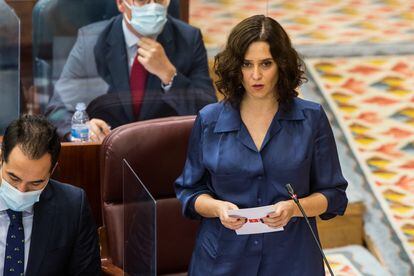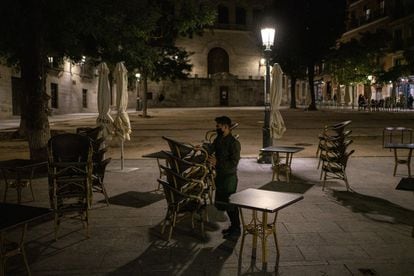Madrid High Court strikes down Health Ministry’s coronavirus restrictions
As a result of the decision, fines cannot be levied on citizens who break the perimetral confinements of 10 cities and the continuance of the measures themselves is now hanging in the balance
/cloudfront-eu-central-1.images.arcpublishing.com/prisa/TUUGPKR465ESBC6VMLRMXHH2ZI.jpg)

The Madrid High Court ruled on Thursday that it would not ratify the coronavirus restrictions that were forced on the region by the central government, despite the opposition of the regional administration to implement them. The court reached its decision on the basis that the measures infringe on citizens’ fundamental rights.
There was confusion on Thursday as to the immediate effects of the ruling, although it was confirmed that fines cannot now be levied on citizens who flout the perimetral confinement of 10 cities in the region, including the Spanish capital. The court ruling does not, however, have an effect on the other restrictions imposed, such as capacity limits for bars and restaurants, and early closing times for all establishments, as well as a limit of six people for meetings both in public and private.
By midday on Thursday, the Madrid regional government had yet to comment on the ruling or announce what it would do next. It is unknown whether the 45 basic healthcare areas with the highest infection rates that were placed under similar restrictions by the Madrid regional government before the central administration intervened will be subject to those measures once more.
The central government, run by a coalition of the Socialist Party (PSOE) and junior partner Unidas Podemos, has recently been engaged in a battle with the Madrid regional government, which is headed by the conservative Popular Party (PP) in coalition with center-right Ciudadanos (Citizens) and propped up by far-right Vox.

Over the last few weeks, the epidemiological situation in Madrid has worsened drastically, but the regional premier, Isabel Díaz Ayuso, has been unwilling to implement stricter coronavirus measures on the basis that they would do further harm to the economy. She has accused the central government of intervening in Madrid for political reasons.
Last Wednesday, the central government eventually reached an agreement that was voted for by the majority of Spain’s regional administrations that involved the aforementioned restrictions – such as perimetral lockdowns and early closing times for businesses – in municipalities with more than 100,000 residents should a set of criteria be met.
On Friday, only municipalities in Madrid met that criteria, and as such 10 cities in the region – including the Spanish capital – were confined from that night onward. The regional government, however, opted not to impose fines on citizens for breaking the restrictions until the Madrid High Court issued its ruling. What’s more, Ayuso’s government on Friday filed an appeal with the national High Court, the Audiencia Nacional, against the measures on the basis they encroached on its powers.
Earlier this week, other regions also implemented the central government’s measures, with the PP-run Castilla y León government, for example, confining the cities of León and Palencia. By Tuesday, 5.2 million residents of Spain were under the restrictions.

The national High Court will now also have to rule on whether or not to suspend the restrictions as a precautionary measure while it considers the Madrid government’s appeal. The region has 10 days from the time it presented the appeal to file its arguments against the central government’s actions, which in turn will then have to be considered in a period of five days by judges.
The national High Court has already rejected the immediate suspension of the restrictions, as requested by Vox and a private attorney, on the basis that there “are no special reasons of urgency” to do so. The Madrid High Court has also done the same with a similar appeal filed there by the far-right party.
Today’s ruling from the Madrid High Court comes despite support for the new measures on the part of the public prosecutor, whose report stated that they were in line with “criteria of proportionality” given the high risk of coronavirus infections in Madrid and on the basis that “the right to life and to health” should take precedence over any other consideration.
The rejection of the measures by the Madrid court comes ahead of a long weekend, with Monday, October 12 being a national holiday. This first holiday weekend after the summer is traditionally a time when thousands of Madrileños travel to their second residences in the region’s mountains, in neighboring regions or they head to the countryside or the beach.
The Spanish Health Minister Salvador Illa said on Thursday on hearing the news of the court ruling that the central government will adopt “the judicial decisions that best protect the health” of citizens, without clarifying what these may be. “We are sure that the Madrid region will support this approach,” he added. After today’s ruling was announced, the PP’s mayor of Madrid, José Luis Martínez-Almeida, called on Madrileños to act responsibly, encouraging them not to go out unless it was essential to do so.
English version by Simon Hunter.
/cloudfront-eu-central-1.images.arcpublishing.com/prisa/UGPTUJSGFZCIDHLR457KY5WOAI.jpg)
/cloudfront-eu-central-1.images.arcpublishing.com/prisa/CFKD7BYLCBA2PCGZTKGPJJ32TI.jpg)










































